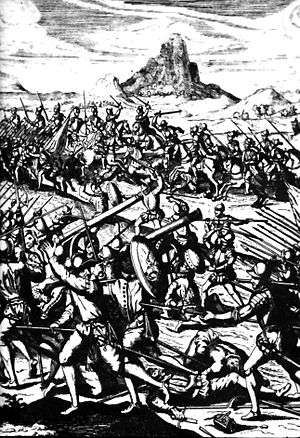Battle of Chupas
After the assassination of Francisco Pizarro, in retaliation for his father's execution in 1538, Diego de Almagro II, El Mozo, continued to press claims as the rightful ruler of Peru and as leader of his father's supporters. His claims were largely unsuccessful, however, as Pizarro was succeeded as governor by Cristóbal Vaca de Castro, despite claims from his brother Gonzalo Pizarro, whose claims to join arms against the Almagristas and "El Mozo" largely remained unanswered.
| Battle of Chupas | |||||||
|---|---|---|---|---|---|---|---|
| Part of the Spanish conquest of Peru | |||||||
 Battle of Chupas | |||||||
| |||||||
| Belligerents | |||||||
|
|
Almagristas Rebels | ||||||
| Commanders and leaders | |||||||
|
Cristóbal Vaca de Castro Francisco de Carvajal Alonso de Alvarado | Diego de Almagro II (POW) | ||||||
| Strength | |||||||
| Unknown | Unknown | ||||||
| Casualties and losses | |||||||
| Unknown | At least 200 Almagristas | ||||||
The battle
Desperate not to face the same fate as his father after the battle of Las Salinas, Diego de Almagro II gathered an army of supporters. Vaca de Castro met and defeated de Almagro's army outside Huamanga (Ayacucho) at Chupas, on 16 September 1542, the year following Pizarro's murder. De Almagro was executed the same day on the city plaza after a brief trial. 1200 Spaniards fought in the battle. Vaca de Castro's forces killed 200 Almagristas, and hanged many more later that day.[1]
References
- MacQuarrie, Kim (2008). The Last Days of the Incas. Simon & Schuster. p. 344. ISBN 0743260503. Retrieved 21 September 2014.